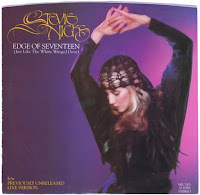If you love 80s music, you've likely danced to "I Ran (So Far Away)" by A Flock of Seagulls. The catchy synth-pop tune, which was released as a single in 1982, became an instant classic and one of the defining hits of the New Romantic movement. Led by lead singer and keyboardist Mike Score, the Liverpool-based band fused futuristic sounds, melodic hooks, and atmospheric lyrics to create a sound that was both nostalgic and innovative. Let's explore some of the elements that make "I Ran" such a memorable track.
The opening riff: The song begins with a swooshing synthesizer arpeggio that sets the tone for the rest of the song. It's a simple but effective melody that captures the feeling of being swept away by a gust of wind. The riff repeats several times throughout the song, becoming almost hypnotic and trance-like.
The vocals: Mike Score's voice is instantly recognizable, with its high-pitched falsetto, exaggerated British accent, and occasional yelps. The lyrics tell a story of a man who is chased by aliens or other unknown entities, as he tries to escape from an unknown planet. The imagery is vivid and surreal, but also relatable, as we all sometimes feel like we're running away from something or someone.
The chorus: Perhaps the most iconic part of the song is the chorus, which features the titular phrase "I Ran (So Far Away)" repeated four times in a row. It's a simple but effective hook that gets stuck in your head and begs to be sung along with. The pulsing beat, the shimmering arpeggios, and the soaring vocals create a bigger-than-life feeling that transports you to a fantastical world.
The guitar solo: After the second chorus, the song breaks down to a more atmospheric instrumental section that features a memorable guitar solo by Paul Reynolds. The solo is melodic, lyrical, and emotional, adding a human touch to the otherwise electronic landscape of the song. It's a testament to the band's ability to blend different genres and sensibilities.
The ending: Like many great songs, "I Ran" doesn't end abruptly but fades out slowly, leaving you wanting more. The final lines of the lyrics are "It's not over yet," and indeed, the song has continued to resonate with generations of music lovers long after its initial release. It's been covered, remixed, sampled, and referenced in various forms of pop culture, from movies to TV shows to video games.
In conclusion, "I Ran" by A Flock of Seagulls is more than just a catchy pop song - it's a masterpiece of 80s music that combines innovation, nostalgia, and emotions into a unique sonic experience. Whether you're a fan of synth-pop, New Wave, or just good music in general, this song is definitely worth running to.



































